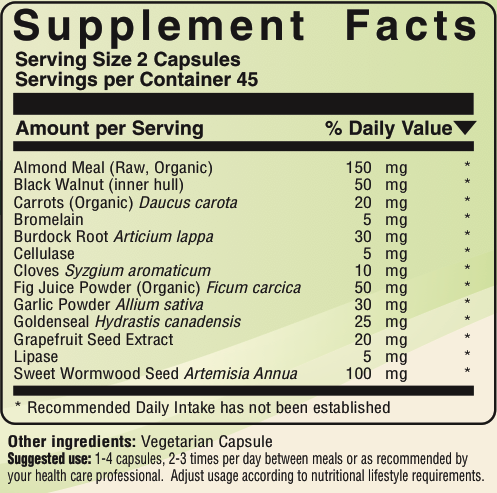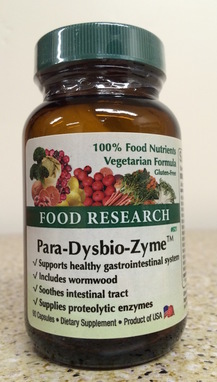
Para-Dysbio-ZymeTM
90 Capsules 25.98
90 Capsules 25.98
Parasites, once considered to only be a problem in the developing world, increasingly are becoming problems in the more industrialized countries [1]. “[P]arasitic pathogens cause a wide spectrum of potentially debilitating symptoms as well as malabsorption. The severity and duration of these manifestations are determined by complex interactions between parasite factors such as virulence and antigenic variation…Giardia lamblia, Cryptosporidium, and Entamoeba histolytica…protozoan parasites are among the most frequently identified intestinal parasites in the United States” [1]. Tests are often inconclusive, false negatives are common, and even if found in standard medical tests, those found can be innocuous. However, whether they are found or not, parasites can and do cause a variety of health and digestive problems.
Decades ago, it was written, “In trying to eliminate these parasites, the use of poisons has been the usual practice. These poisons are far less satisfactory than the enzyme method…It so happens that there are also some plant enzymes that digest insect protein. (Enzymes are highly selective in there action; here we have one that digests the insect protein (chitin) without correspondingly affecting the human tissue.) The plants apparently use these enzymes in their self-defense against insects” [2]. Products containing plants such as fig powder and almonds have long been recommended for intestinal complaints where parasites could be a factor such as flatulence, abdominal pain and tenderness, epigastric gnawing and distress (often simply called stomach-aches by children), nervousness, loss of weight, constipation or diarrhea (usually the latter), irregular fever, pruritus, anti nausea, vomiting, mucous in stools, and blood in stools (Note: Seek medical attention for blood in stools, possible appendicitis, or other medical issues) [2].
Almond meal has long been used in anti-parasitic formulas [2]. Raw almonds, like other raw seed products, contain enzyme-inhibitors as well as enzymes [3]. Enzyme inhibitors not only help seeds to not sprout prematurely, they also allow substances to pass further into the intestines without being as digested than items without enzyme inhibitors. “Almonds have a demulcent {soothing, irritation reducing} effect” [4].
Black Walnut “is used for gastrointestinal catarrh and as a blood purifier” [4]. “Walnut is astringent and fungistatic. The juglone content in the walnut hulls has been linked to mutagenic action…The antifungal effect comes from the juglone content” [4].
“Bromelain …has putative anti-inflammatory, immunomodulatory, antidiarrheal, anticarinogenic and wound healing actions…Bromelain’s digestant ability is based on its ability to hydrolyze proteins to oligopeptides and amino acids…Bromelain has been shown to increase CD2-mediated T cell activation, to enhance antigen-independent binding to monocytes and to increase interferon” [5]. Animal studies confirm its effectiveness against Escherichia coli [5].
Burdock “Animal and in vitro data report that burdock may have had antibacterial, antineoplastic, antioxidant, antiretroviral, and anti-inflammatory properties…Preparations of Burdock Root are used for ailments of the gastrointestinal tract, as a diaphoretic and diuretic, and for blood purifying” [4].
Cellulase is an enzyme which is helpful for digesting cellulose which is contained in most plants [5]. “Cellulase is used as a digestive aid...and for the management of flatulence [5].
Cloves have long been used to help combat parasites. Cloves contain substances which have been shown to be effective in combating antibiotic resistant bacteria and various viruses [4].
Carrots supply carotenoids such as betacarotene, a vitamin A precursor, which helps strengthen the immune system [5]. “Scientists in India have discovered that carrots afford significant protection for the liver” as carrots contain substances which “increase the activity of several enzymes that speed up detoxification of the liver and other organs” [6].
Fig Juice Powder has long been used in anti-parasitic formulas [2]. “Ripe figs when fresh contain an enzyme to digest worms. This accounts for the fact that a fig on a tree never has a worm in it” [2]. “In China, figs are used for dysentery and enteritis” {inflammation of the intestinal tract caused by infection or irritating food}[4].
Garlic “[d]etoxifies the body and protects against infection by enhancing immune function. “Garlic kills bacteria” [7]. Garlic…has antimicrobial activity against many genre of bacteria, fungi, and even viruses” [4].
Goldenseal contains a substance known as berberine. “Berberine has shown antimicrobial activity against bacteria, protozoa, and fungi” [4]. It has been found to stop diarrhea [4]. ”Goldenseal alkaloids have modest antimicrobial activity” [8].
Grapefruit Seed Extract “is highly effective against viruses, protozoa, bacteria, and yeast, and has been used for quite some time in other countries for the treatment of parasites” [9]. “Recent testimonials report grapefruit-seed extract, or GSE…to be effective against more than 800 bacterial and viral strains, 100 strains of fungus, and a large number of single and multicelled parasites… The initial data shows GSE to have antimicrobial properties against a wide range of gram-negative and gram-positive organisms at dilutions found to be safe” [10]. An alfalfa related study found that grapefruitseed extract was effective in inhibiting Escherichia coli O157:H7 and Salmonella [11].
Lipase is an enzyme which helps digest lipids (fats) [3]. In parasitic infections, lipase levels tend to reduce [12], thus lipase support can help insure a more healthy intestinal environment.
Sweet Wormwood is also called sweet annie or Artemisia annua. “Its antiprotozoal activity is especially effective against Giardia, but some caution is advised. It can initially cause a worsening of symptoms, allergic reactions, and some intestinal irritation” [9]. It is often used with grapefruit seed extract and other herbs and “it can also be used in conjunction with conventional drug therapy” [9]. Sweet wormwood should not be confused with the restricted (and dangerous) Artemisia absinthe which is normally simply called ‘wormwood’ [13]. “Artemisinins are extracted from sweet wormwood (Artemisia annua) and are the most potent antimalarials available, rapidly killing all asexual stages of Plasmodium falciparum. Artemisinins are sesquiterpene lactones widely used to treat multidrug-resistant malaria” and other parasites [14].
Para-Dysbio-Zyme is not recommended during pregnancy. Many people simply take Para-Dysbio-Zyme as a Food supplement to help them feel better.
Para-Dysbio-Zyme also naturally contains carbohydrates, lipids, proteins (including all ten essential amino acids), and truly organic bioflavonoids as found in specially grown, enzymatically processed Saccharomyces cerevisiae. Unlike many so-called “natural” formulas, Para-Dysbio-Zyme is only comprised of foods, contains no synthetic USP nutrients or isolated mineral salts, but only contains foods, food complexes, and food concentrates.
Numerous university studies have concluded that supplements containing food nutrients are better than USP isolates. Food nutrients are better because they contain important enzymes, peptides, and phytonutrients CRITICAL to the UTILIZATION of vitamins and minerals which are not present in isolated USP nutrients. Published research has concluded that food vitamins are superior synthetic/USP vitamins.
Suggested use: 1-4 capsules, 2-3 times per day between meals or as recommended by your health care professional. Adjust usage according to nutritional lifestyle requirements.
References
[1] Smith P. Parasitic Infections. In Immunology and Immunopathology of the Liver and Gastrointestinal Tract. Igaku-Shoin, NY, 1990: 379-394
[2] Lee R. Vermidase capsules. In Product Bulletins. Circa 1959
[3] Howell E. Enzyme Nutrition. Avery Publishing, Wayne (NJ), 1985
[4] Gruenwald J, Brendler T, Jaenicke C, eds. PDR for Herbal Medicine, 3rd ed. Thompson PDR, Montvale (NJ), 2004
[5] Sheldon S, Rorvik D, eds. PDR for Nutritional Supplements. Medical Economics, Montvale (NJ), 2001
[6] Duke JA. The Green Pharmacy. Rodale Press, Emmaus (PA), 1997
[7] Ingram C. Super-Market Remedies. Knowledge House, Buffalo Grove (IL), 1998
[8] DerMardenosian A, ed. The Review of Natural Products. Facts and Comparisons, St. Louis, 2000
[9] Strohecker J, ed. Alternative Medicine, The Definitive Guide. Future Medicine Publishing, Fife (WA), 1995
[10] Heggers JP, Cottingham J, Gusman J, Reagor L, McCoy L, Carino E, Cox R, Zhao JG. The effectiveness of processed grapefruit-seed extract as an antibacterial agent: II. Mechanism of action and in vitro toxicity. J Altern Complement Med. 2002;8(3):333-340
[11] Fett WF, Cooke PH. Reduction of Escherichia coli O157:H7 and Salmonella on laboratory-inoculated alfalfa seed with commercial citrus-related products. J Food Prot. 2003;66(7):1158-1165
[12] Khovidhunkit W, Kim MS, Memon RA, Shigenaga JK, Moser AH, Feingold KR, Grunfeld C. Effects of infection and inflammation on lipid and lipoprotein metabolism: mechanisms and consequences to the host. J Lipid Res. 2004;45(7):1169-1196
[13] McGuffin M, Hobbs C, Upton R, Goldberg A, eds. American Herbal Products Association’s Botanical Safety Handbook. CRC Press, Boston, 1997
[14] Eckstein-Ludwig U, Webb RJ, Van Goethem ID, East JM, Lee AG, Kimura M, O'Neill PM, Bray PG, Ward SA, Krishna S. Artemisinins target the SERCA of Plasmodium falciparum. Nature. 2003;424(6951):957-961
Some of these studies (or citations) may not conform to peer review standards, therefore, the results are not conclusive. Professionals can, and often do, come to different conclusions when reviewing scientific data. None of these statements have been reviewed by the FDA. All products distributed by Doctors’ Research, Inc. are nutritional and are not intended for the treatment or prevention of any medical condition.
 |
||
|
||
